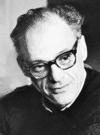- Miller, Arthur
-
born Oct. 17, 1915, New York, N.Y., U.S.U.S. playwright.He began writing plays while a student at the University of Michigan. His first important play, All My Sons (1947), was followed by his most famous work, Death of a Salesman (1949, Pulitzer Prize), the tragedy of a man destroyed by false values that are in large part the values of his society. Noted for combining social awareness with a searching concern for his characters' inner lives, Miller wrote many other plays, including The Crucible (1953), which uses a plot about the Salem witch trials to attack McCarthyism, A View from the Bridge (1955), After the Fall (1964), and The Last Yankee (1992). He also wrote short stories, essays, and the screenplay for The Misfits (1961), which starred his second wife, Marilyn Monroe.
 Arthur Miller, photograph by Inge MorathMagnum
Arthur Miller, photograph by Inge MorathMagnum* * *
▪ American playwrightborn October 17, 1915, New York, New York, U.S.died February 10, 2005, Roxbury, ConnecticutAmerican playwright, who combined social awareness with a searching concern for his characters' inner lives. He is best known for Death of a Salesman (1949).Miller was shaped by the Depression, which spelled financial ruin for his father, a small manufacturer, and demonstrated to the young Miller the insecurity of modern existence. After graduation from high school he worked in a warehouse. With the money he earned he attended the University of Michigan (B.A., 1938), where he began to write plays. His first public success was with Focus (1945), a novel about anti-Semitism. All My Sons (1947), a drama about a manufacturer of faulty war materials that strongly reflects the influence of Henrik Ibsen (Ibsen, Henrik), was his first important play. Death of a Salesman became one of the most famous American plays of its period. It is the tragedy of Willy Loman, a small man destroyed by false values that are in large part the values of his society. Miller received a Pulitzer Prize for the play, which was later adapted for the screen (1951).The Crucible (1953) was based on the witchcraft trials in Salem, Massachusetts, in 1692, a period Miller considered relevant to the 1950s, when investigation of subversive activities was widespread. In 1956, when Miller was called before the House Un-American Activities Committee, he refused to name people he had seen 10 years earlier at an alleged communist writers' meeting. He was convicted of contempt but appealed and won.A Memory of Two Mondays and another short play, A View from the Bridge (a story of an Italian-American longshoreman whose passion for his niece destroys him), were staged on the same bill in 1955. After the Fall (1964) is concerned with failure in human relationships and its consequences. The Price (1968) continued Miller's exploration of the theme of guilt and responsibility to oneself and to others by examining the strained relationship between two brothers. He directed the London production of the play in 1969. The Archbishop's Ceiling, produced in Washington, D.C., in 1977, dealt with the Soviet treatment of dissident writers. The American Clock, a series of dramatic vignettes based on Studs Terkel's Hard Times (about the Great Depression), was produced at the 1980 American Spoleto Festival in Charleston, South Carolina. Later plays include The Ride Down Mount Morgan (1991), Mr. Peters' Connections (1998), and Resurrection Blues (2002).Miller also wrote a screenplay, The Misfits (1961), for his second wife, the actress Marilyn Monroe (Monroe, Marilyn) (1926–62); they were married from 1956 to 1961. The filming of The Misfits served as the basis for the play Finishing the Picture (2004). I Don't Need You Any More, a collection of his short stories, appeared in 1967 and a collection of theatre essays in 1977. His autobiography, Timebends, was published in 1987.* * *
Universalium. 2010.
